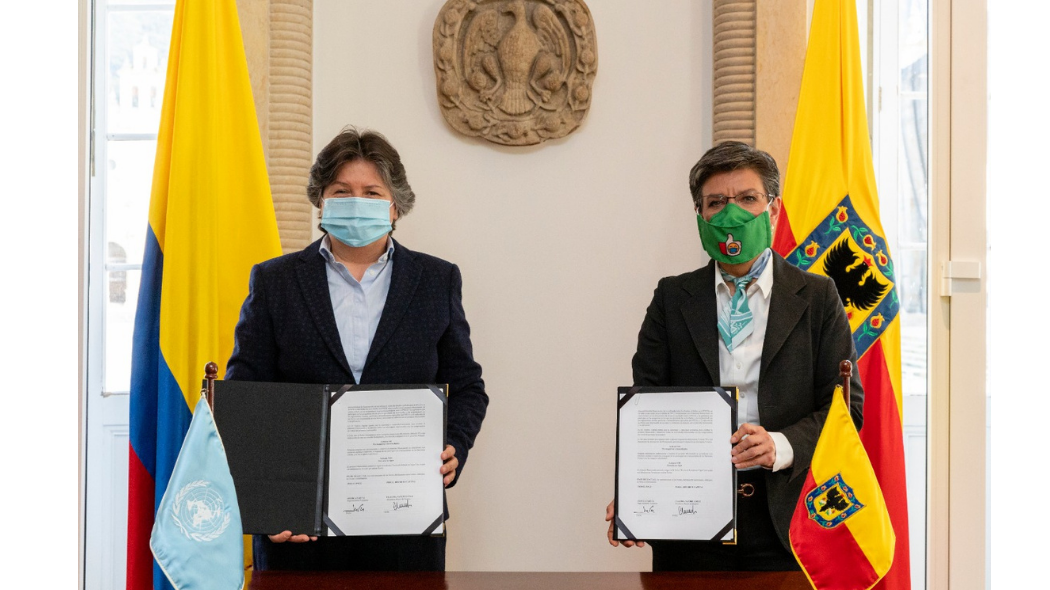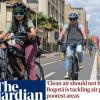This friday, December 4, the mayor of Bogotá, Claudia López, signed a Memorandum of Understanding with the United Nations Development Program (UNDP), with the aim of framing the technical cooperation between this multilateral organization and the district in an agreement that covers some of the main issues of the District Development Plan and deepens in the Agenda 2030, taking into account the social and economic impacts derived from the COVID-19.
This alliance will benefit multiple sectors within the district. The Memorandum has 5 strategic lines of cooperation. The signing ceremony of this instrument was attended by the UNDP in Colombia: Jessica Faieta, resident representative; Alejandro Pacheco, deputy resident representative, and Blanca Cardona, national manager of the democratic governance area. The event was also attended by Luz Amparo Medina, district director of international relations.
The first area is the Territorialization of Agenda 2030 and the acceleration of the ODS, where the UNDP will provide support in the construction of the Bogotá Local Voluntary Report on the progress in the fulfillment of Agenda 2030, which will be presented in the framework of the United Nations General Assembly in 2022.
The second strategic line consists of Bogotá's objective to achieve greater equality of opportunities for social, productive and political inclusion, as established in its District Development Plan. This line is of great importance because it promotes the advancement of the Sustainable Development Goals associated with the end of poverty (1), quality education (4), gender equality (5), decent work and economic growth (8) and the reduction of inequalities (10).
Within this area, we highlight the support to the District Care System; the assistance to programs and plans of economic reactivation as a response to the crisis generated by the pandemic, mainly those focused on generating employment and capacities of the MSMEs; the program of acceleration of the ODS number 4 through education, culture and science, with the support of UNESCO.
The third line refers to the purpose of the Mayor's Office of Bogotá to position the city as a space of trust and an epicenter of peace and reconciliation, framed in the ODS 16 that seeks to guarantee peace, justice and solid institutions. On this point, the actions referring to the support to the High Counseling for Victims, Peace and Reconciliation in its lines of the rural PDET of Sumapaz and the support to the design of the Observatory of Social Dialogue stand out.
Fourthly, this memorandum seeks to provide technical cooperation regarding adaptation to the effects of climate change, in line with the ODS for clean water and sanitation (6), action for climate (13) and life of terrestrial ecosystems (15). In this area, UNDP will be an important ally in the design of the Payment for Environmental Services (PES) program scheme, linked to other biodiversity conservation and ecosystem service strategies in the rural areas of the Capital District.
Finally, the fifth point of the memorandum focuses on promoting open, transparent government and conscientious citizenship, strengthening progress in the fulfillment of ODS number 16. This strategic line includes support for citizen security and local justice strategies and the strengthening of the Government Center of Bogotá.
These five areas, as well as the projects and actions that accompany them, will provide great value to advance the vision of making Bogotá a global reference in the implementation of the ODS and to fulfill the goals established in the District Development Plan to build a more just, equitable, and sustainable city.
Thus, Bogotá and the District Directorate of International Relations ratify their progress in working together with other United Nations agencies on issues such as gender equity, migration, food and nutritional security, the fight against corruption, education, and children and adolescents.






